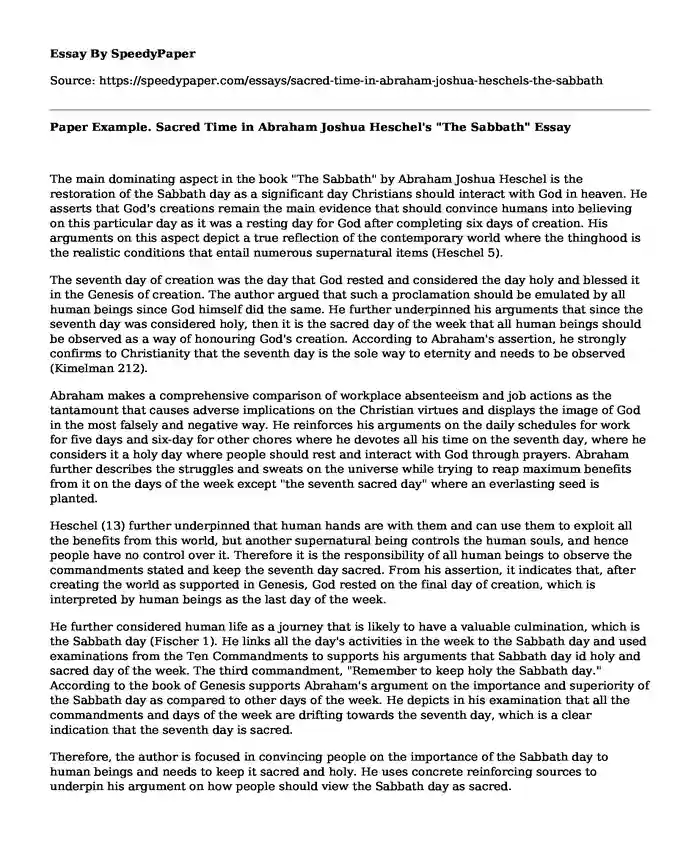
| Type of paper: | Course work |
| Categories: | God Christianity Books |
| Pages: | 3 |
| Wordcount: | 644 words |
The main dominating aspect in the book "The Sabbath" by Abraham Joshua Heschel is the restoration of the Sabbath day as a significant day Christians should interact with God in heaven. He asserts that God's creations remain the main evidence that should convince humans into believing on this particular day as it was a resting day for God after completing six days of creation. His arguments on this aspect depict a true reflection of the contemporary world where the thinghood is the realistic conditions that entail numerous supernatural items (Heschel 5).
The seventh day of creation was the day that God rested and considered the day holy and blessed it in the Genesis of creation. The author argued that such a proclamation should be emulated by all human beings since God himself did the same. He further underpinned his arguments that since the seventh day was considered holy, then it is the sacred day of the week that all human beings should be observed as a way of honouring God's creation. According to Abraham's assertion, he strongly confirms to Christianity that the seventh day is the sole way to eternity and needs to be observed (Kimelman 212).
Abraham makes a comprehensive comparison of workplace absenteeism and job actions as the tantamount that causes adverse implications on the Christian virtues and displays the image of God in the most falsely and negative way. He reinforces his arguments on the daily schedules for work for five days and six-day for other chores where he devotes all his time on the seventh day, where he considers it a holy day where people should rest and interact with God through prayers. Abraham further describes the struggles and sweats on the universe while trying to reap maximum benefits from it on the days of the week except "the seventh sacred day" where an everlasting seed is planted.
Heschel (13) further underpinned that human hands are with them and can use them to exploit all the benefits from this world, but another supernatural being controls the human souls, and hence people have no control over it. Therefore it is the responsibility of all human beings to observe the commandments stated and keep the seventh day sacred. From his assertion, it indicates that, after creating the world as supported in Genesis, God rested on the final day of creation, which is interpreted by human beings as the last day of the week.
He further considered human life as a journey that is likely to have a valuable culmination, which is the Sabbath day (Fischer 1). He links all the day's activities in the week to the Sabbath day and used examinations from the Ten Commandments to supports his arguments that Sabbath day id holy and sacred day of the week. The third commandment, "Remember to keep holy the Sabbath day." According to the book of Genesis supports Abraham's argument on the importance and superiority of the Sabbath day as compared to other days of the week. He depicts in his examination that all the commandments and days of the week are drifting towards the seventh day, which is a clear indication that the seventh day is sacred.
Therefore, the author is focused in convincing people on the importance of the Sabbath day to human beings and needs to keep it sacred and holy. He uses concrete reinforcing sources to underpin his argument on how people should view the Sabbath day as sacred.
Work Cited
Fischer, Dov. "The Sabbath By Abraham Joshua Heschel." Journal Of Biblical Integration In Business, vol 18, no. 1, 2015, p. ., https://cbfa-jbib.org/index.php/jbib/article/view/114. Accessed 3 Mar 2020
Heschel, Abraham Joshua. "The Sabbath: It's Meaning for Modern Man (New York: Farrar, Straus and Giroux, 1951)." The Kabbalistic work Sefer Yetsira 6.1.
Kimelman, Reuven. "Abraham Joshua Heschel's Theology of Judaism and the Rewriting of Jewish Intellectual History." The Journal of Jewish Thought and Philosophy 17.2 (2009): 212-213.
Cite this page
Paper Example. Sacred Time in Abraham Joshua Heschel's "The Sabbath". (2023, Apr 13). Retrieved from https://speedypaper.net/essays/sacred-time-in-abraham-joshua-heschels-the-sabbath
Request Removal
If you are the original author of this essay and no longer wish to have it published on the SpeedyPaper website, please click below to request its removal:
- Free Essay Sample on Intercultural Intelligence
- Mohammed Ali Research in the Free Essay Sample
- Investment Essay Sample: Risk and Returns Analysis
- Essay Sample Describing Social Work Practice with Hispanic Families
- Impact of Business Ethics on Labor Conditions - Essay Sample
- What on Earth Am I Here For - Essay Sample
- Essay Sample. The History of Information Communication Technology
Popular categories




